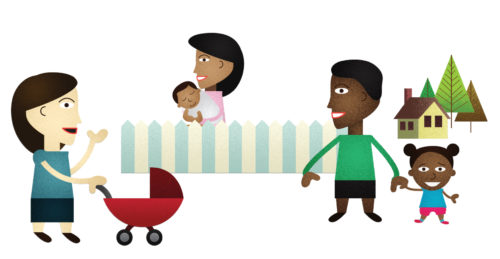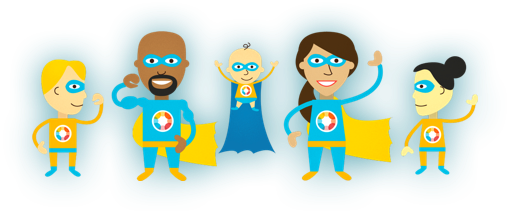Talking about Vaccines

As a member of the Immunity Community, you are part of a vast network of people who choose to vaccinate their families. We want to help people make educated, informed decisions about vaccines for their family. Together, we can build an Immunity Community that allows us all to thrive.
Sharing your views about vaccines is going to be easy and rewarding most of the time. When you share your opinion about vaccines, you will find many people who completely agree with you and are relieved that someone is FINALLY saying positive things about vaccines.
In talking to lots of people, we’ve found that most people who have questions about vaccines are coming from a fear-based, emotional place. Make sure you appeal to their brain and heart when answering questions about vaccines.
Now let’s get talking.
Keystone Statements
When sharing your beliefs about vaccination, it’s nice to have a few keystone or go-to statements that help you succinctly express your values. These keystone statements can be used at the beginning, middle, or end of a conversation.
HEART Method
When you are having a conversation about vaccines, try the HEART (Hear, Empathize, Analyze, Resources, Tell) Method
Effective Messages
The most effective messages are the ones that you fully embrace and believe in. Think about why you made the choice to vaccinate your family. Sharing your choice to vaccinate will be your emotional core and provide compelling reasons that will inspire others.
Gracefully Exiting a Tough Conversation
Vaccines are important, but they are not something to lose a friendship over. Don’t forget to respect your friend's opinion, and trust that they will do the same.
Keystone Statements
- I choose to vaccinate my child.
- Vaccines protect my child from 14 diseases.
- Most of us vaccinate our kids—and I’m glad. It keeps our community healthy and gives diseases fewer opportunities to spread.
- Vaccines are the best choice for my family.
Personalize these statements so that you can remember them easily. Having these in your back pocket will help you feel prepared for every conversation!
HEART Method
Hear: The first and best thing you can do is to really listen to their concerns and questions. Really hear what they fear about vaccines. Organize your thoughts before answering their questions.
Empathize: Start your response with an emotional acknowledgement of their feelings. Address their investment in the issue. They’ve put a lot of thought into this problem. Give them the credit they deserve for being the concerned parents they are. Example: “You’ve put so much thought into this. I think it’s great that you care so much about your child’s health.”
Analyze: Ask questions to understand where they’re getting their information from and what concerns them. Example: “I’ve been researching vaccines, too. Where did you hear that from?”
Resources: Answer their emotional concerns with knowledge and specific information from the FAQ page. Facts, paired with emotion, win parents over! Example: “That’s very interesting. What I’ve read on the Internet is pretty different. There’s a nonprofit organization called Vaccinate Your Family that talks about how vaccines are safe and how they protect kids from dangerous diseases like whooping cough.”(Then insert talking points or trustworthy resources from the FAQs page to answer their specific questions.)
Tell: Conclude your points with another emotional statement that sums up what benefits you gain from vaccinating your child. Example: “After I read both sides of the argument, I decided to vaccinate my children. I get so worried when my child is sick, and I can’t bear the thought of her getting sick with something that could be avoided. For me, vaccines are all about prevention.”
Repeat this method with every concern they raise. Make sure to start over at the “Hear” stage to ensure you are answering their specific questions. Even if they share an anecdotal story of their own, really listen to their fear and try to understand their root concern.
Remember, you might not sway them today, but you have opened their minds to other ways of thinking about vaccines. You might not be an expert on vaccines and you may not have all the answers. But through conversations like this, you make yourself a valuable and increasingly trusted resource to those who have questions.
Effective Messages
Use “I” statements: Using “I” statements emphasizes your experience and knowledge. Giving a lecture or being preachy turns people off quickly. Everyone wants to protect their child, and parents who question vaccines are just going about it in a different way. Here are a few examples:
- I vaccinate my children.
- I believe that vaccines are the best choice for my family.
- Vaccines are a choice. I’ve spent time researching the facts, and weighed the risks and the benefits. I feel they are the safer risk and the right choice to protect my family.
- For me, vaccinating my child is not just about protecting my child but also about protecting everyone in my life and my community.
Use Anecdotes: Share stories from your experience to help frame why you value vaccines. Research has found that using science as a first talking point is a turn-off for many parents. There is a general lack of trust in and understanding of the scientific and medical process. Instead, use personal stories of how you arrived at the choice to vaccinate:
“I remember my baby’s first vaccines. I was so scared seeing all those needles lined up and thinking about sticking my perfect baby. But I knew that protecting my baby from disease outweighed the risks of vaccination.”
Gracefully Exiting a Tough Conversation
Here is a good phrase to help you get out of a tough conversation:
“Thank you for sharing your opinions with me. I’m just glad we both care about protecting our kids’ health. Thank you for being so passionate.”
Now just smile and divert the conversation to something you both can agree on.
Remember, you might not sway your friends today, but you may have sparked a new way of thinking about vaccines. You have become an information source they can turn to with questions later.

